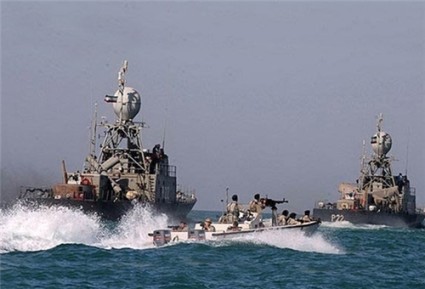LATEST
- French Foreign Minister: Unlimited Inspections of Iran’s Military Sites Must Be Part of Nuclear Deal
- Iran Claims It Foiled US Cyber-Attack on Oil Ministry
WEDNESDAY FEATURES
Journalist Rezaian’s Trial — Judge “Convicts” Him of Helping Another Reporter
Supreme Leader Calls on MPs to Support Nuclear Talks, Admits Effects of Sanctions
In its latest tough posture, Iran’s navy has announced that US warships comply with their orders in the Persian Gulf.
Rear Admiral Ali Fadavi, the commander of the Revolutionary Guards’ naval forces, told reporters on Tuesday:
We observe confrontations and, as a matter of fact, debates between Iran and the foreign vessels in the Persian Gulf and the Strait of Hormuz on a daily basis. They always comply.
Fadavi claimed that the Persian Gulf, the Strait of Hormuz and Iran’s territorial waters are “the most secure geographical waters in the world”: “Different types of foreign military vessels and 40 US warships and logistic ships are present in these regions but certainly, security is established there due to the measures adopted by our forces.”
He said that Iran is planning to mass-produce missile-launching speedboats which can travel up to 80 knots per hour.
On Monday another Revolutionary Guards commander, Brigade General Abdolreza Vajdian, said that Navy drones and patrol boats were always recording movements of the US warships deployed in the Persian Gulf:
The presence of the US aircraft carriers in the Persian Gulf is meant to intimidate [but] our forces don’t feel any fear at all. We are constantly taking footage of the warships.
Vajdian declared that the recent Payambar-e Azam (The Great Prophet) war games, in which a mock aircraft carrier was destroyed by missiles, displayed Iran’s power in the Persian Gulf to its enemies.
In the past month, Iran has forced a Marshall Islands-flagged cargo ship and 34 crews into port — releasing it after payment of a claimed debt for non-delivery of containers — and fired shots across the bow of a Singapore-flagged tanker. Tehran also declared that its navy would protect a cargo ship delivering aid to Yemen, although it later diverted the ship to Djibouti in east Africa with the UN handling the food and supplies.
French Foreign Minister: Unlimited Inspections of Iran’s Military Sites Must Be Part of Nuclear Deal
French Foreign Minister Laurent Fabius has tried to put inspections of Iran’s military sites at the forefront of nuclear talks.
Fabius told French legislators on Wednesday, “France will not accept [a deal] if it is not clear that inspections can be done at all Iranian installations, including military sites.”
The Foreign Minister said he wanted the other 5+1 Powers (US, Britain, China, France, and Germany) to adopt France’s position of “Yes to an agreement, but not to an agreement that will enable Iran to have the atomic bomb”.
The International Atomic Energy Agency’s head Yukiya Amano elevated the issue of military sites on May 12 when said the IAEA must have access at any point. Iranian officials responded firmly that they would not allow this, even as they joined the Additional Protocol of the Nuclear Non-Proliferation Treaty upon completion of a deal.
Amano repeated on Wednesday:
When we find inconsistency or when we have doubts we can request access to the undeclared location for example, and this could include military sites.
Some consideration is needed because of the sensitiveness of the site, but the IAEA has the right to request access at all locations, including military ones.
Iran Claims It Foiled US Cyber-Attack on Oil Ministry
The head of Iran’s cyber-police said on Tuesday that his units foiled a US cyber-attack on the Iranian Oil Ministry.
Brigadier General Seyed Kamal Hadianfar told a forum in Tehran that the attack was halted in late March, during Iranian New Year holidays:
These hackers were from the US and we informed them [American officials] of the issue in an official letter and also issued an international judicial order. The issue is now being pursued by the foreign ministry.

